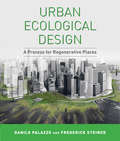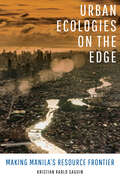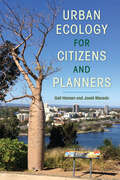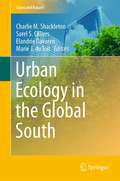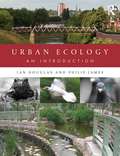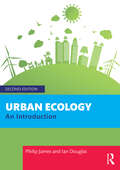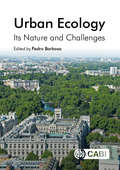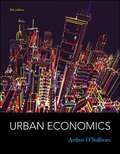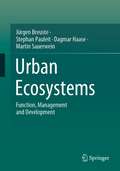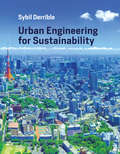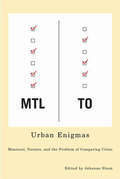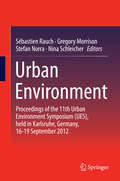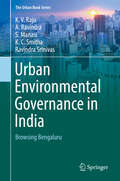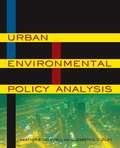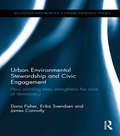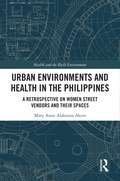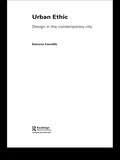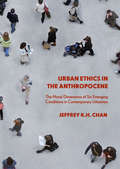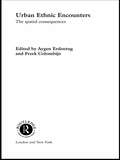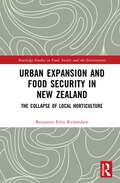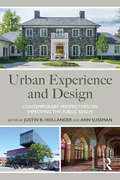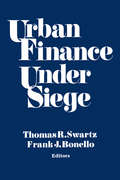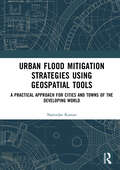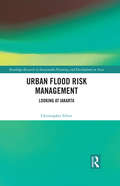- Table View
- List View
Urban Ecological Design: A Process for Regenerative Places
by Danilo Palazzo Frederick R. SteinerThis trailblazing book outlines an interdisciplinary "process model" for urban design that has been developed and tested over time. Its goal is not to explain how to design a specific city precinct or public space, but to describe useful steps to approach the transformation of urban spaces. Urban Ecological Design illustrates the different stages in which the process is organized, using theories, techniques, images, and case studies. In essence, it presents a "how-to" method to transform the urban landscape that is thoroughly informed by theory and practice. The authors note that urban design is viewed as an interface between different disciplines. They describe the field as "peacefully overrun, invaded, and occupied" by city planners, architects, engineers, and landscape architects (with developers and politicians frequently joining in). They suggest that environmental concerns demand the consideration of ecology and sustainability issues in urban design. It is, after all, the urban designer who helps to orchestrate human relationships with other living organisms in the built environment. The overall objective of the book is to reinforce the role of the urban designer as an honest broker and promoter of design processes and as an active agent of social creativity in the production of the public realm.
Urban Ecologies on the Edge: Making Manila's Resource Frontier
by Kristian Karlo SaguinLaguna Lake, the largest lake in the Philippines, supplies Manila's dense urban region with fish and water while operating as a sink for its stormflows and wastes. Transforming the lake to deliver these multiple urban ecological functions, however, has generated resource conflicts and contradictions that unfold unevenly across space. In Urban Ecologies on the Edge, Kristian Karlo Saguin tracks the politics of resource flows and unpacks the narratives of Laguna Lake as Manila's resource frontier. Provisioning the city and keeping it safe from floods are both frontier-making processes that bring together contested socioecological imaginaries, practices, and relations. Combining fieldwork and historical accounts, Saguin demonstrates how people—powerful and marginalized—interact with the state and the environment to produce the unequal landscapes of urbanization at and beyond the city's edge.
Urban Ecology for Citizens and Planners
by Gail Hansen Joseli MacedoIdeal for city residents, developers, designers, and officials looking for ways to bring urban environments into harmony with the natural world and make cities more sustainable, Urban Ecology for Citizens and Planners offers a wealth of information and examples that will answer fundamental scientific questions, guide green initiatives, and inform environmental policies and decision-making processes. This book provides an overview of the synergistic relationships between humans and nature that shape the ecology of urban green spaces. It also emphasizes the social and cultural value of nature in cities for human health and well-being. Chapters describe the basic science of natural components and ecosystems in urban areas and explore the idea of biophilic urbanism, the philosophy of building nature into the framework of cities. To illustrate these topics, chapters include projects, case studies, expert insights, and successful citizen science programs from urban areas around the world. Authors Gail Hansen and Joseli Macedo argue that citizens have increasingly important roles to play in the environmental future of the cities they live in. A valuable resource for real-world solutions, this volume encourages citizens and planners to actively engage and collaborate in improving their communities and quality of life.
Urban Ecology in the Global South (Cities and Nature)
by Charlie M. Shackleton Sarel S. Cilliers Elandrie Davoren Marié J. du ToitAgainst the background of unprecedented rates of urbanisation in the Global South, leading to massive social, economic and environmental transformations, this book engages with the dire need to understand the ecology of such settings as the foundation for fostering sustainable and resilient human settlements in contexts that are very different to the Global North. It does so by bringing together scholars from around the world, drawing together research and case studies from across the Global South to illustrate, in an interdisciplinary and comprehensive fashion, the ecology of towns and cities in the Global South. Framed using a social-ecological systems lens, it provides the reader with an in-depth analysis and understanding of the ecological dynamics and ecosystem services and disservices within the complex and rapidly changing towns and cities of the Global South, a region with currently scarce representation in most of the urban ecology literature. As such the book makes a call for greater geographical balance in urban ecology research leading towards a more global understanding and frameworks. The book embraces the complexity of these rapid transformations for ecological and environmental management and how the ecosystems and the benefits they provide shape local ecologies, livelihood opportunities and human wellbeing, and how such knowledge can be mobilised towards improved urban design and management and thus urban sustainability.
Urban Ecology: An Introduction
by Ian Douglas Philip JamesUrban Ecology: An Introduction seeks to open the reader’s mind and eyes to the way in which nature permeates everyday urban living, and how it has to be understood, cared for, and managed in order to make our towns and cities healthier places to visit and in which to live and work. The authors examine how nature can improve our physical and mental health, the air we breathe and the waters we use, as well as boosting our enjoyment of parks and gardens. Urban Ecology sets out the science that underlies the changing natural scene and the tools used to ensure that cities become both capable of adapting to climate change and more beautiful and resilient. The book begins with a discussion of the nature of urban places and the role of nature in towns and cities. Part 1 looks at the context and content of urban ecology, its relationship to other foci of interest within ecology and other environmental sciences, and the character of city landscapes and ecosystems. In Part 2 the authors set out the physical and chemical components of urban ecosystems and ecological processes, including urban weather and climate, urban geomorphology and soils, urban hydrology and urban biogeochemical cycles. In Part 3 urban habitats, urban flora and fauna, and the effects of, deliberate and inadvertent human action on urban biota are examined. Part 4 contains an exploration of the identification and assessment of ecosystem services in urban areas, emphasising economic evaluation, the importance of urban nature for human health and well-being, and restoration ecology and creative conservation. Finally, in Part 5 the tasks for urban ecologists in optimising and sustaining urban ecosystems, providing for nature in cities, adapting to climate change and in developing the urban future in a more sustainable manner are set out. Within the 16 chapters of the book – in which examples from around the world are drawn upon - the authors explore current practice and future alternatives, set out procedures for ecological assessment and evaluation, suggest student activities and discussion topics, provide recommended reading and an extensive bibliography. The book contains more than 150 tables and over 150 photographs and diagrams.
Urban Ecology: An Introduction
by Ian Douglas Philip JamesThis fully revised second edition reflects the great expansion in urban ecology research, action, and teaching since 2015. Urban ecology provides an understanding of urban ecosystems and uses nature-based techniques to enhance habitats and alleviate poor environmental conditions. Already the home to the majority of the world’s people, urban areas continue to grow, causing ecological changes throughout the world. To help students of all professions caring for urban areas and the people, animals, and plants that live in them, the authors set out the environmental and ecological science of cities, linkages between urban nature and human health, urban food production in cities, and how we can value urban nature. The authors explore our responsibilities for urban nature and greening, ecological management techniques, and the use of nature-based solutions to achieve a better, more sustainable urban future and ensure that cities can climate change and become more beautiful and more sustainable places in which to live. This text provides the student and the practitioner with a critical scientific overview of urban ecology that will be a key source of data and ideas for studies and for sound urban management.
Urban Ecology: Its Nature and Challenges
by Steven Frank Pedro Barbosa Aaron M Grade Adam J Terando Amanda E Sorensen Dennis VanEngelsdorp Elsa Youngsteadt Desiree L Narango Gail A Langellotto Heidi Liere Holly Martinson Ignacio Castellanos Iriana Zuria John G Kelcey Katherine Straley Lea Johnson Lindsay Miller Barranco Lisa Kuder Michael J Raupp Monika Egerer Nancy B Grimm Nancy Falxa Sonti Paige S Warren Rebecca C Jordan Riley Andrade Steward T Pickett Susannah B LermanToday, 55% of the world's human population lives in urban areas. By 2030, up to 90% of the global human population will live in cities and the global population is expected to increase by 68% by 2050. Although land cover categorized as "urban" is a relatively small fraction of the total surface of the Earth, urban areas are major driving forces in global environmental change, habitat loss, threats to biodiversity, and the loss of terrestrial carbon stored in vegetation biomass. These and many other factors highlight the need to understand the broad-scale impacts of urban expansion as it effects the ecological interactions between humans, wildlife and plant communities. In a series of essays by leading experts this book defines urban ecology, and provides much-needed focus on the main issues of this increasingly important subdiscipline such as the impacts of invasive species, protecting pollinators in urban environments, the green cities movement and ecological corridors. The book stresses the importance of understanding ecological forces and ecosystem services in urban areas and the integration of ecological concepts in urban planning and design. The creation of urban green spaces is critical to the future of urban areas, enhancing human social organization, human health and quality of life. Urban ecology is becoming a foundational component of many degree programs in universities worldwide and this book will be of great interest to students and researchers in ecology and conservation science, and those involved in urban planning and urban environmental management.
Urban Economics
by Arthur O'SullivanOver the course of two decades, Urban Economics has achieved a worldwide audience, and has been translated into Chinese, Greek, Russia, and Korean. Like the seven previous editions, this edition provides a clear and concise presentation of the economic forces that: (a) cause the development of cities;(b) determine the spatial form of cities;(c) cause urban economies to grow or shrink;(d) generate urban problems such as poverty, crime, and congestion;(e) make the market for urban housing unique; and(f) shape the tax and spending policies of local government. In addition to developing the basic concepts of urban economics, the book uses economic analysis to evaluate the merits of policies designed to address our most vexing urban problems. The text is designed for use in undergraduate courses in urban economics and urban affairs. It could also be used for graduate courses in urban planning, public policy, and public administration. All of the economic concepts used in the book are covered in the typical intermediate microeconomics course, so students who have completed such a course will be able to move through the book at a rapid pace.
Urban Ecosystems: Function, Management and Development
by Stephan Pauleit Dagmar Haase Jürgen Breuste Martin SauerweinThis textbook on urban ecosystems answers important questions about the ecological structure, functions and socio-ecological development of cities worldwide. Based on how cities are developing today in an increasingly urbanized world, it explains ecological challenges for cities of the 21st century such as resource efficiency, climate change, moderation of quality of life and resilience. The book combines theories of urban development and ecology with practical applications and case studies, thus identifying potential for improvement and examples of good ecological urban development worldwide. It shows that cities are by far not only problem areas but also offer great potential for a good life and that the various urban ecosystems can make a considerable contribution to this. The "eco-city" is thus not a utopia,but a real goal that can be pursued step by step in a targeted manner, taking into account the local and regional context.Four renowned urban ecologists have contributed their specific experience in sub-areas without losing sight of the big picture. Jürgen Breuste is an urban ecologist and works at the Paris Lodron University in Salzburg, Austria, on the topics of sustainable urban development, urban biodiversity, ecosystem services and eco-cities. Dagmar Haase is Landschaftsökologin and works at the Humboldt University of Berlin on urban ecosystem services and land use modeling. Stephan Pauleit is a landscape planner and works at the Technical University of Munich on strategies for the sustainable development of urban landscapes. Martin Sauerwein is a geographer and works at the University of Hildesheim on geo-ecology in cultural landscapes, geoarchaeology and soil protection.The textbook addresses a broad audience of students, teachersand also to practitioners in the fields of ecology, urban ecology, urban development, sustainability, urban geography, nature and landscape conservation, spatial planning, landscape ecology, social sciences and urban studies. The numerous photos and graphics, many of them in four colors, as well as clear tables illustrate the facts. Case studies, examples and explanations allow a deeper insight. Questions at the end of each chapter allow the progress of knowledge to be checked, and a comprehensive bibliography for each chapter provides further studies.This book is a translation of the original German 1st edition Stadtökosysteme by Jürgen Breuste published by Springer Fachmedien Wiesbaden GmbH, part of Springer Nature in 2016. The translation was done with the help of artificial intelligence (machine translation by the service DeepL.com). A subsequent human revision was done primarily in terms of content, so that the book will read stylistically differently from a conventional translation. Springer Nature works continuously to further the development of tools for the production of books and on the related technologies to support the authors.This springer essential is a translation of the original German 1st edition essentials,Stadtökosysteme by Jürgen Breuste published by Springer Fachmedien Wiesbaden GmbH, part of Springer Nature in 2016. The translation was done with the help of artificial intelligence (machine translation by the service DeepL.com). A subsequent human revision was done primarily in terms of content, so that the book will read stylistically differently from a conventional translation. Springer Nature works continuously to further the development of tools for the production of books and on the related technologies to support the authors.
Urban Engineering for Sustainability (The\mit Press Ser.)
by Sybil DerribleA textbook that introduces integrated, sustainable design of urban infrastructures, drawing on civil engineering, environmental engineering, urban planning, electrical engineering, mechanical engineering, and computer science.This textbook introduces urban infrastructure from an engineering perspective, with an emphasis on sustainability. Bringing together both fundamental principles and practical knowledge from civil engineering, environmental engineering, urban planning, electrical engineering, mechanical engineering, and computer science, the book transcends disciplinary boundaries by viewing urban infrastructures as integrated networks. The text devotes a chapter to each of five engineering systems—electricity, water, transportation, buildings, and solid waste—covering such topics as fundamentals, demand, management, technology, and analytical models. Other chapters present a formal definition of sustainability; discuss population forecasting techniques; offer a history of urban planning, from the Neolithic era to Kevin Lynch and Jane Jacobs; define and discuss urban metabolism and infrastructure integration, reviewing system interdependencies; and describe approaches to urban design that draw on complexity theory, algorithmic models, and machine learning. Throughout, a hypothetical city state, Civitas, is used to explain and illustrate the concepts covered. Each chapter includes working examples and problem sets. An appendix offers tables, diagrams, and conversion factors. The book can be used in advanced undergraduate and graduate courses in civil engineering and as a reference for practitioners. It can also be helpful in preparation for the Fundamentals of Engineering (FE) and Principles and Practice of Engineering (PE) exams.
Urban Enigmas: Montreal, Toronto, and the Problem of Comparing Cities (Culture of Cities #2)
by Johanne SloanContributors, part of the collaborative research project The Culture of Cities: Montreal, Toronto, Dublin, and Berlin, address theoretical and methodological aspects of comparison, while case-studies examine the mutually constituted identities of Montreal and Toronto through examples of travel writing, public art, film festivals, theatrical performances, diasporic communities, ethnic festivals, and urban media. Comparison is shown to be not only something performed by experts but a deeply embedded, everyday social practice that contributes to the mutable identities of cities. Urban Enigmas demonstrates that the accumulation of urban actions, encounters, experiences, and relationships create distinctive patterns that make it possible to recognize the particularity of cities.
Urban Enigmas: Montreal, Toronto, and the Problem of Comparing Cities (Culture of Cities Series)
by Johanne SloanContributors, part of the collaborative research project The Culture of Cities: Montreal, Toronto, Dublin, and Berlin, address theoretical and methodological aspects of comparison, while case-studies examine the mutually constituted identities of Montreal and Toronto through examples of travel writing, public art, film festivals, theatrical performances, diasporic communities, ethnic festivals, and urban media. Comparison is shown to be not only something performed by experts but a deeply embedded, everyday social practice that contributes to the mutable identities of cities. Urban Enigmas demonstrates that the accumulation of urban actions, encounters, experiences, and relationships create distinctive patterns that make it possible to recognize the particularity of cities.
Urban Environment
by Sébastien Rauch Gregory Morrison Stefan Norra Nina SchleicherOver half of the global population now lives in cities. This ongoing urbanisation is making it increasingly important to adequately manage urban systems and preserve urban environments. This book is the outcome of the 11th Urban Environment Symposium (UES) held on 16-19 September 2012 in Karlsruhe, Germany. The UES aims at providing a forum on the sciences and practices needed to promote a sustainable future in urban environments. Papers by leading experts are presented in sections on Urban Management and Spatial Planning, Green Cities and Urban Ecosystems, Urban Planning and Development, Air Quality and Noise, Urban Climate Change and Adaptation, and Contamination of Urban Waters and its Effects.
Urban Environmental Governance in India: Browsing Bengaluru (The Urban Book Series)
by K. V. Raju S. Manasi A. Ravindra K. C. Smitha Ravindra SrinivasThis book aims to identify the challenges presented by current urban environmental governance practices in fast growing Indian cities, to propose changes to the current governance implementation strategies, and to explore the best practices to achieve sustainable urban models through Indian and global perspectives. With a focus on the city of Bengaluru, the book draws on extensive reviews of literature and data to present current trends and statuses of environmental resource use in growing urban centres of India.The book analyzes the situations that impact urban environmental governance decisions and outcomes and proposes solutions to address these issues for long-term sustainability. Policy makers, researchers, academics and development practitioners in environmental politics and urban governance will find this work of great interest.The book starts by examining different urban environmental threats on global and domestic levels, and provides evidence for the effectiveness of sustainable efforts to curb the impact of crisis-like scenarios. Then the book discusses the role of institutional regimes in influencing urban environmental outcomes through policies, and analyzes the role of various actors in the evolution of urban environmental governance from a legal perspective at global and local scales. In the final chapters, the book explores the trends and status of environmental resource management in Bangalore Metropolitan Area (BMA), and examines the dynamics of local institutions and governance structures for regulating environmental governance for promoting effective sustainable environmental governance in Bengaluru.
Urban Environmental Policy Analysis
by Heather E. Campbell Elizabeth A CorleyThis timely book provides a wealth of useful information for following through on today's renewed concern for sustainability and environmentalism. It's designed to help city managers, policy analysts, and government administrators think comprehensively and communicate effectively about environmental policy issues.The authors illustrate a system-based framework model of the city that provides a holistic view of environmental media (land, air, and water) while helping decision-makers to understand the extent to which environmental policy decisions are intertwined with the natural, built, and social systems of the city. They go on to introduce basic and environment-specific policy-analytic models, methods, and tools; presents numerous specific environmental policy puzzles that will confront cities; and introduces methods for understanding and educating public opinions around urban environmental policy.The book is grounded in the policy-analytic perspective rather than political science, economic, or planning frameworks. It includes both new scholarship and synthesis of existing policy analysis. Numerous tables, figures, checklists, and maps, as well as a comprehensive reference list are included.
Urban Environmental Stewardship and Civic Engagement: How planting trees strengthens the roots of democracy (Routledge Explorations in Environmental Studies)
by Dana R. Fisher Erika S. Svendsen James ConnollyOnce considered the antithesis of a verdant and vibrant ecosystem, cities are now being hailed as highly efficient and complex social ecological systems. Emerging from the streets of the post-industrial city are well-tended community gardens, rooftop farms and other viable habitats capable of supporting native flora and fauna. At the forefront of this transformation are the citizens living in the cities themselves. As people around the world increasingly relocate to urban areas, this book discusses how they engage in urban stewardship and what civic participation in the environment means for democracy. Drawing on data collected through a two-year study of volunteer stewards who planted trees as part of the MillionTreesNYC initiative in the United States, this book examines how projects like this can make a difference to the social fabric of a city. It analyses quantitative survey data along with qualitative interview data that enables the volunteers to share their personal stories and motivations for participating, revealing the strong link between environmental stewardship and civic engagement. As city governments in developed countries are investing more and more in green infrastructure campaigns to change the urban landscape, this book sheds light on the social importance of these initiatives and shows how individuals’ efforts to reshape their cities serve to strengthen democracy. It draws out lessons that are highly applicable to global cities and policies on sustainability and civic engagement.
Urban Environments and Health in the Philippines: A Retrospective on Women Street Vendors and their Spaces (Health and the Built Environment)
by Mary Anne AkersUrban Environments and Health in the Philippines offers a retrospective view of women street vendors and their urban environments in Baguio City, designed by American architect and planner Daniel Burnham in the early twentieth century, and established by the American imperial government as a place for healing and well-being. Based on a transdisciplinary multi-method study of street vendors, the author offers a unique perspective as a researcher of the place, to ultimately ask how marginalized women authenticate and democratize prime urban spaces for their livelihoods. This book provides a portal to another way of seeing and understanding streets and people, covering spatial units at multiple scales, design imperialism and its impact on health, and resilience strategies for challenging realities. Blending subjects of architecture, planning, and health, this book is an ideal read for those interested in fields of urban planning and design, public health, landscape architecture, geography, and social sciences.
Urban Ethic: Design in the Contemporary City
by Eamonn CanniffeAlthough contemporary practice in urbanism has many sources of design guidelines, it lacks theory to provide a flexible approach to the complexities of most urban situations. The author provides that theoretical framework, looking beyond the style obsession of urban makeovers to the fundamental elements of city-making. The scope of this book takes in illuminating historical analysis and significant theoretical coherence, while recent case studies link the physical environment to the citizens within it, ultimately offering a new methodology for the analysis and design of urban spaces which encourages a balance between diversity and community.
Urban Ethics in the Anthropocene: The Moral Dimensions of Six Emerging Conditions in Contemporary Urbanism
by Jeffrey K.H. ChanIncreasingly, we live in an environment of our own making: a ‘world as design’ over the natural world. For more than half of the global population, this environment is also thoroughly urban. But what does a global urban condition mean for the human condition? How does the design of the city and the urban process, in response to the issues and challenges of the Anthropocene, produce new ethical categories, shape new moral identities and relations, and bring about consequences that are also morally significant? In other words, how does the urban shape the ethical—and in what ways? Conversely, how can ethics reveal relations and realities of the urban that often go unnoticed? This book marks the first systematic study of the city through the ethical perspective in the context of the Anthropocene. Six emergent urban conditions are examined, namely, precarity, propinquity, conflict, serendipity, fear and the urban commons.
Urban Ethnic Encounters: The Spatial Consequences (Routledge Research in Population and Migration #5)
by Aygen Erdentug Freek ColombijnUrban Ehtnic Encounters attempts to answer the two leading questions of how urban space structures the life of ethnic groups and how ethnic diversity helps to shape urban space. A multidisciplinary team of authors searches the various dimensions of the spatial organization of inter-ethnic relations in cities and countries around the globe. Unlike most ethnographies in which authors write about the 'other' in faraway places, the majority of the contributors have studied their own society.The case studies are from four different continents. Material is presented from diverse locations such as the cities of Toronto, Philadelphia, Vienna, Beirut, Jakarta, Tehran, Osaka and Albuquerque, and the countries of Israel, Brazil and Taiwan, presents a unique opportunity for comparative analysis of ethnicity and spatial patterns. From this wealth of material important inter-cultural conclusions can be made about urban ethnic diversity.
Urban Expansion and Food Security in New Zealand: The Collapse of Local Horticulture (Routledge Studies in Food, Society and the Environment)
by Benjamin Felix RichardsonThis book examines suburban development in New Zealand and its conflict with and impact on local horticulture and food security. Drawing on an ethnographic study of Auckland’s rapidly expanding urban periphery, combined with comparative case studies from California in the USA and Victoria in Australia, the book examines how the profit-making strategies of property developers and landowners drastically reshapes work and life at the edge of cities. With a significant portion of the world's croplands lying adjacent to cities, the accelerating pace of urban sprawl across the planet places unprecedented pressure on the productivity and even existence of these vital food bowl regions. The book examines how the demand for more land for development at the urban periphery collides with concerns over local food security and the protection of ecosystem services. It analyses land use policy, historical records, and physical patterns of development, alongside participant observation of local events. It combines this with interviews with government officials, property developers, landowners, local residents and horticulturists. By combining these narratives of the hectic and lucrative business of suburban property development with the collapse of local horticulture, this book shows how the realignment of the New Zealand's interests of financial profitability over other concerns led to the transformation of urban peripheries from a productive food bowl to an investment vehicle. This book will be of great interest to students and scholars of urban food and agriculture, urban planning and development and rural-urban studies.
Urban Experience and Design: Contemporary Perspectives on Improving the Public Realm
by Justin B. Hollander; Ann SussmanEmbracing a biological and evolutionary perspective to explain the human experience of place, Urban Experience and Design explores how cognitive science and biometric tools provide an evidence-based foundation for architecture and planning. Aiming to promote the creation of a healthier and happier public realm, this book describes how unconscious responses to stimuli, outside our conscious awareness, direct our experience of the built environment and govern human behavior in our surroundings.This collection contains 15 chapters, including contributions from researchers in the US, the UK, the Netherlands, France and Iran. Addressing topics such as the impact of eye-tracking analysis and seeing beauty and empathy within buildings, Urban Experience and Design encourages us to reframe our understanding of design, including the narrative of how modern architecture and planning came to be in the first place. This volume invites students, academics and scholars to see how cognitive science and biometric findings give us remarkable 21st-century metrics for evaluating and improving designs, even before they are built.
Urban Finance Under Siege
by Thomas R. Swartz Frank J. BonelloAn account of the later years of Tsarism. Witte presents portraits of the statesmen around him, explains the problem of bringing the economy to a level commensurate with Russia's putative position as the greatest land power in the world and the effort to create a constitutional monarchy.
Urban Flood Mitigation Strategies Using Geo Spatial Tools: A Practical Approach for Cities and Towns of Developing World
by Narendar KumarThe disastrous effects of floods in urban areas of various Indian cities have been increasing in severity and extent over the past decade. This book explores flood disasters, their impact in world and Indian contexts, assessing vulnerability and risks involved, and systematic use of (GIS)-enabled platforms to map mitigation measures sustainably, with special reference to the metropolitan flood mitigation endeavors. This book balances the theoretical with empirical approaches to form a unique standpoint on the various challenges and possible solutions to urban flooding in India. Through a study of major urban flood incidents, this book analyzes the factors which contribute to the rising risk of flooding with increasing urbanization, population dynamics, growth, and urban sprawl, with particular focus on the cities of Chennai, Mumbai, and Hyderabad in India. It also examines disaster governance on urban floods and legislative prospects of flood disasters through discussions on standing acts, United Nations (UN) directives, and internationally adopted practices and actions, which are applicable in the Indian context. An interdisciplinary study, this book brings together tools and research from various disciplines including geography, urban and regional planning, and GIS. It will be an invaluable resource for researchers, scholars, engineers, students, planners, academicians, and professionals of cross-disciplines to help them resolve the problem of urban flooding. It will also be of interest to the general reader seeking to learn more about disasters, urban flooding, engineering, and GIS.
Urban Flood Risk Management: Looking at Jakarta (Routledge Research in Sustainable Planning and Development in Asia)
by Christopher SilverLike so many of the coastal cities in Southeast Asia (and other regions) established during European colonialism, there has been an ongoing challenge for decades dealing with the growing frequency and intensity of flooding. Jakarta’s flood problems since the 1990s have been nothing less than monumental and the inability of the local and national governments to mitigate flooding in Jakarta is the most visible manifestation of fundamental water management deficiencies. This book offers a comprehensive and systematic historical assessment of Jakarta’s water management practices from the colonial era through the early years of the Indonesian republic and Jakarta’s emergence as a sprawling megacity. This book draws upon a vast multidisciplinary literature and a wide array of government documents to unravel the complex history of water management that has led to approximately 40% of the city now lying below sea level. This book will be a useful reference to those who research on topics such as urbanization in Southeast Asia, sustainable development, urban and planning history, environmental planning, issues of water management (and flooding) and the politics of planning and development.
